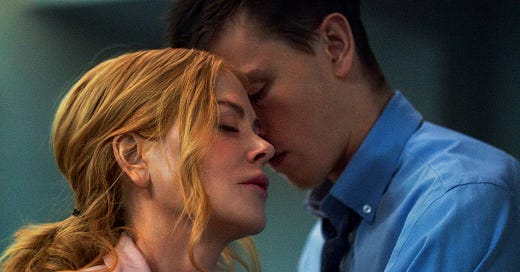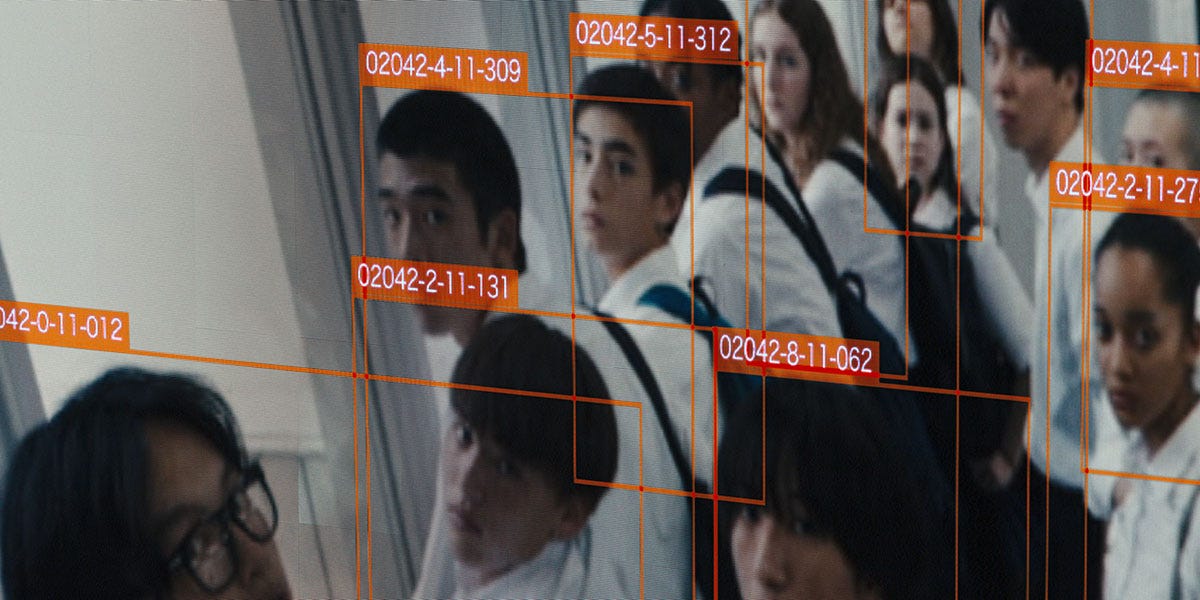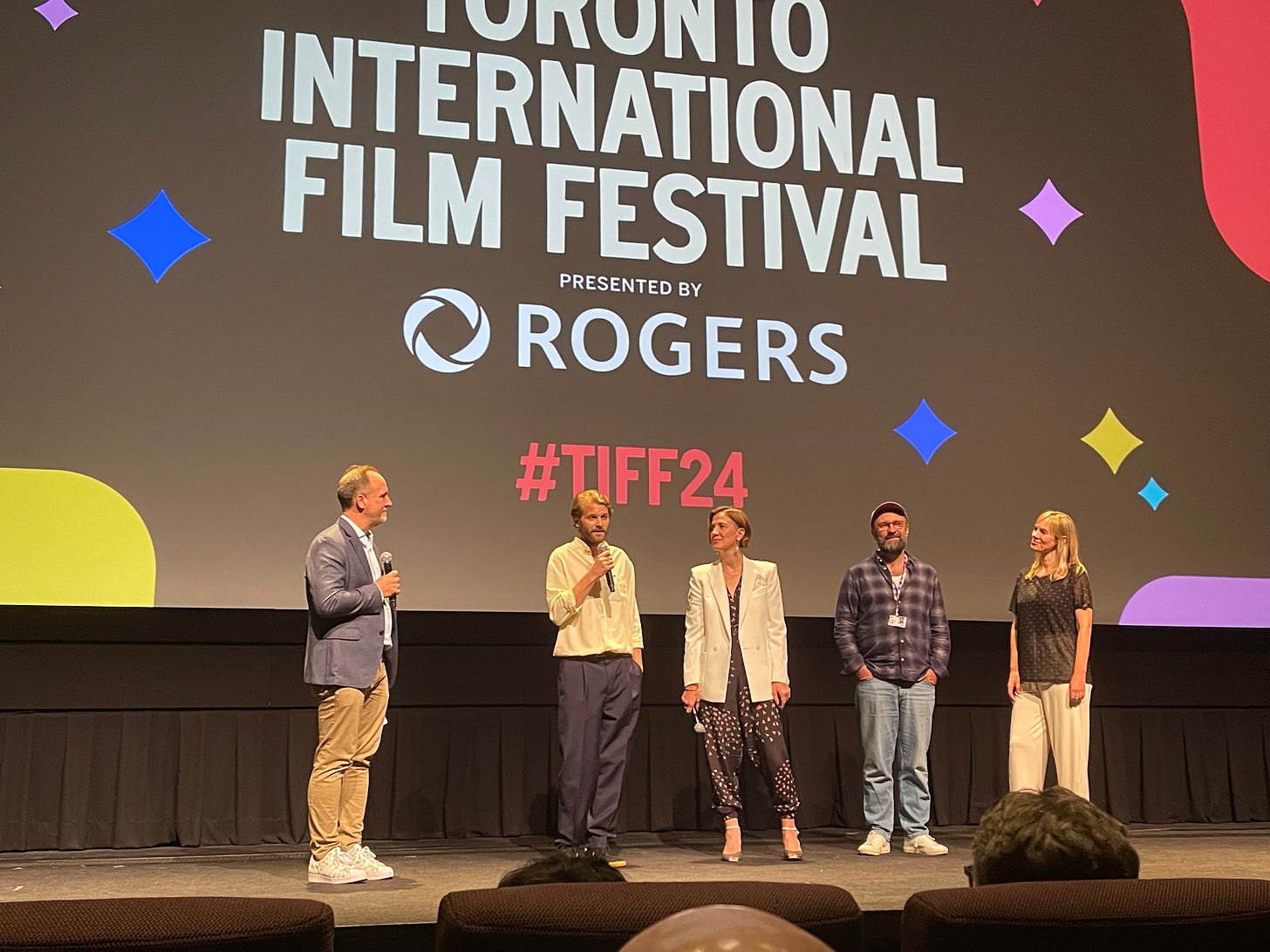[TIFF 2024] We Come to This Place for Nicole Kidman
Babygirl and the wonders of international cinema
Hey, so, you might remember I mentioned in the last instalment of my TIFF reviews that I wasn’t able to secure tickets to Babygirl. It’s a film that was very high on my list of must-sees for this year’s festival — both because I love Nicole Kidman and will watch anything she’s in just because she is in it, but also because the film had a lot of success at Venice — unfortunately, other people seemingly had the same idea and the two public screenings for the film sold out nearly immediately after going on sale. However, after shuffling my existing schedule around a bit and, admittedly, with a bit of luck, I found myself at a Wednesday morning press and industry screening. I’ll share my thoughts and review below shortly but the thrill of getting into this screening is something I will probably remember for years to come, and definitely among the highlights of this year’s TIFF for me.
Before jumping into the new set of reviews, check out my first two from TIFF:
Happyend
Probably the first TIFF film this year that I really thought wasn’t good, Happyend is a sci-fi drama examining the issues of surveillance and social credit.
It’s a film that starts off relatively strongly, establishing a world in the near-future where a group of high schoolers work together to rebel against a system of authoritarianism and surveillance at their school. However, I found that even if the idea itself is compelling, it has been done before in films and television, most notably in Black Mirror. And unfortunately, Happyend fails to develop the conflict in its nearly two-hour runtime. It introduces the issue of earthquakes and the government’s power play in relation to them but that thread is never really explored in favour of focusing on smaller-scale issues of surveillance within the high school setting which is where I believe a mistake was made. The school’s surveillance system punishes students for things like smoking on school property and littering, and while I understand that the director may have wanted to use a smaller-scale issue to show how the government’s authoritarianism seeps into every aspect of life, I don’t think getting reprimanded by a teacher or a principal for littering is inherently bad. And the students’ — as well as the story’s — dissatisfaction with it comes off as nothing but entitled.
Ultimately, Happyend is a film with a promising start and a good idea that fails to develop beyond very high-level thoughts that have been done multiple times before, and through that, it also fails to develop its characters in a way that would make the audience care for them and get invested into the story.
My Sunshine
My Tuesday was seemingly reserved for Japanese cinema as I went from Happyend straight into the North American premiere of My Sunshine. It’s a quiet, introspective story about a young hockey player who tries out figure skating — both to get closer to a local figure skater he likes and because he is not very good at hockey.
If you’ve read my work previously, I have stated that I don’t particularly like slow films. But the truth is, I don’t think I necessarily have an issue with a slower pace but rather think that a slow film is much more difficult to execute well since it’s easier to lose your audience when the pace of the story isn’t there to keep them engaged. My Sunshine is a very slow film, with little dialogue and a conflict that starts slow and low-stakes but grows into something bigger and more sinister throughout the story. However, it is also an excellent, and a very engaging film.
The quadruple-threat director, writer, cinematographer, and editor Hiroshi Okuyama has a strong sense for aesthetic which is obvious in every frame, bringing the snowy landscapes and bright colours to support the narrative and draw the audiences into the story. The film is delicate but powerful and easily slots into my favourites from the festival.
Babygirl
One of my most anticipated films of the festival and one I wasn’t sure I would be seeing until only half an hour prior to the screening, Babygirl is an exploration of seduction, power dynamics, and a film for those who desperately want to find someone who will match their freak. The film can stand as an erotic thriller but leans into its absurdity with really strong comedic moments slotted into its more risqué ones.
Nicole Kidman seems to be at a stage in her career where she can take whichever role she wants, no matter how silly or freaky, and this one seems to be one where she really leans into her freak and shines without holding herself back. It’s why the film works as well as it does. She doesn’t do the role halfway, and she doesn’t take a satirical approach. Some of the writing and the dialogue do feel a bit satirical but the characters don’t which is what seals the deal in terms of the film’s delivery of its more erotic moments.
Babygirl is a film that certainly subverts the expectations and one that is filled with solid twists throughout. It’s a film that I watched at 8:45 a.m. and can confirm that that may have been an insane choice. It’s a film that might not be for everyone but one that will definitely elicit reactions from its audience. It also just might be up there with Nicole Kidman’s career bests.
The Friend
What starts off as a Hallmark drama, The Friend transforms into a lovely story about friendship, grief, and love in all of its forms. It’s a very slow paced film, and potentially a few minutes longer than it needed to be, but The Friend’s emotionality really sneaks up on you. I will admit, there was a point about halfway through, where I nearly started to doze off — courtesy of back-to-back screenings and some very late nights this week — but the final act of the film drew me in with its tenderness and ultimately made for a very satisfying ending.
Naomi Watts does a solid job with her character who is very Karen-like and she certainly makes it hard for the viewer to root for her, yet by the end of the film, it is so clear how the character was affected by the loss of a close friend — and potential something more — that we were introduced to at the very beginning of the story.
The star of the film is, without a doubt, the dog. It’s really impressive how well trained he is and how he was able to showcase the emotions with his body language throughout the story. I was also lucky that the dog showed up with the directors for the post-screening Q&A which was a lot of fun! The film was also a hit with the group of senior citizens sat right behind me in the theatre, so I imagine this is a film your grandparents will love, even if you might not.
The Girl with the Needle
The Girl with the Needle is a dark tale of one of Denmark’s most heinous crimes told through the eyes of a fictional character whose path intertwines with the real story. Beautifully shot in black and white, the film transcends genres with elements of thriller and crime blending into horror.
Incredible cinematography and the meticulous set and costume design set the scene for the urban hellscape that was the 1918 Copenhagen. It’s a story of poverty, exploitation, sexual harassment, and atrocious crimes that also holds relevance in a more modern day context as it touches on the issues of reproductive rights and bodily autonomy.
The story is engaging yet wicked, and the final act is so expertly done it will have you thinking about it for days after the screening. Not knowing the film was based on a true story was what made it even more nerve-racking for me, having no clue where the story would go. However, I do think it would have been similarly powerful even if I had known what the final outcome would be. The twist is utterly shocking if you don’t, though.
Nightbitch
A film about motherhood, Nightbitch has proven itself to be a lot better than the trailer had led us to believe. It’s a strong performance from Amy Adams and a story both absurd and audacious in ways that are quite refreshing to see on the big screen.
Amy Adams really sells the challenges of motherhood, even to audiences like myself who are not familiar with it first-hand. There is a warmth to her character that makes her believably a good mother but the versatility of her character is also depicted well when she interacts with adults in her life who she feels less warmth for than she does for her kid.
Nightbitch is really entertaining, even when its ultimate message feels a bit on the nose. It is certainly one of those films where a more abstract approach to its main message would have made it more relatable to a wider audience — though maybe the film doesn’t need to be relatable to an audience beyond mothers as its entertainment value is still there for everyone to enjoy. I also think it could have leaned a bit more into its absurdity. The body horror moments were brief and the lack of further magical realism puts the film in some weird in-between genre that’s hard to define. While imperfect, the film still has a sincere message and provides solid entertainment for what I think could be a relatively wide audience as its entertainment value doesn’t necessarily hinge on its relatability.
Crocodile Tears
Containing horribly accurate depiction of the worst kind of boy moms, Crocodile Tears is an Indonesian thriller that follows the life of a boy living on a crocodile farm with his widowed mom when a mysterious girl enters their lives to potentially ruin everything.
The film features complex and slightly disturbing dynamics between the mother and the son, something Freud would certainly have an interesting time with. The three lead actors deliver strong performances, with Marissa Anita who plays the mother leading the way with her haunting depiction of the mentally disturbed single mother. She was at the Q&A after my screening and — without spoiling anything — it was great hearing her talk about observing the crocodiles they acted with, and learning from them to put together her performance for this film.
Crocodile Tears is also a film that doesn’t feel the need to explain itself, trusting the audience to follow the clues and to reach conclusions on their own. This is one of the main things I appreciated about this film as I generally can’t stand the writing that assumes that the viewer — me — is, to put it bluntly, stupid. The pacing was also expertly done, with a slower start that picks up the pace the build the foundation for its climax in a way that is really engaging and fitting for the story.
Overall, a wonderful debut for director Tumpal Tampubolon.
As we head into the final weekend of TIFF, I can’t help but reflect on the eighteen films I’ve seen so far and how some of my favourites have been international productions that are very likely never getting a global theatrical release. It’s one of my favourite thing about this festival. Many of the big titles, ones that I have seen over the past week and ones I decided to skip out on, I will have the opportunity to see in cinemas shortly. But it’s the international hidden gems that we only get a chance to see once a year at TIFF, and that is something I value so greatly about festivals in general but also about TIFF with its strong international programming. My Sunshine and The Girl with the Needle have probably been my international favourites so far, but both Crocodile Tears and Sad Jokes (which I wrote about in my previous TIFF post) are wonderful hidden gems that I will recommend to anyone who has the ability to see them.




![[TIFF 2024] Bonjour from TIFF](https://substackcdn.com/image/fetch/$s_!GqqF!,w_140,h_140,c_fill,f_auto,q_auto:good,fl_progressive:steep,g_auto/https%3A%2F%2Fsubstack-post-media.s3.amazonaws.com%2Fpublic%2Fimages%2F3812cec1-674d-4389-8db5-c913d0e8b44b_3024x1909.jpeg)
![[TIFF 2024] From Uninhabited Tropical Islands to Midtown Manhattan](https://substackcdn.com/image/fetch/$s_!6c8c!,w_140,h_140,c_fill,f_auto,q_auto:good,fl_progressive:steep,g_auto/https%3A%2F%2Fsubstack-post-media.s3.amazonaws.com%2Fpublic%2Fimages%2Fd71f94e2-7940-4610-b29f-8dad0f4e1aa3_3800x2280.avif)






